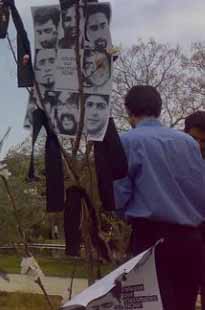| Home > 30 years human rights in Iran > Special cases > Iran's Case Against transsexual | |||
Iran's Case Against transsexualby Mohammad Mostafaitranssexual face many problems in Iran. Once they become aware of their nature, they develop a profound sense of having the wrong sexuality, of having been born in the wrong body. Their families and society expect them to accept roles in accordance with their outside appearance. They put them under pressure and reproach them for any behavior that goes against the mainstream. These external pressures and inner conflicts usually create severe crises for such people. Mohammad Mostafai, a lawyer [that practices before] the Ministry of Justice and is a human rights activist, has been involved with issues facing transsexuals in Iranian society. Mohammad Mostafai: At times, at the moment of birth, the hand of fate determines our lives. The natural expectation is that a human being is born either a boy or a girl. However, in nature, there exists rare exceptions. One such exception is a human who is born bisexual. [Young people] who find themselves [in this situation], are subjected to great unkindness, and in many instances they become outcasts. When they become aware of their special condition, bisexuals go astray. They come under heavy spiritual and psychological pressures. And as long as their status is not clear, they will continue to bear these pressures. Because, unfortunately, in our country there is no place for such people. In Iran, the 'normal' state of being is that people are either boys and spend their time among boys, or they are girls and spend their time among girls. In order for these people to find their proper place in society, occasionally they need to undergo an operation, and sometimes they are unable to afford the cost of such an operation. Last year, I met a transsexual at Evin prison. He was in prison because he had injured someone who had intended to molest him. With promises of getting some money from the opposing party, and then earning his livelihood, and finding his way out of the circumstances he was in, this bisexual youth was lured to a home where they intended to rape him. He attempted to defend himself. After his case went to court, unfortunately this youth was unable to defend himself; that is, he was unable to mount a defense acceptable to the court. So he was sentenced to two years in prison and ordered to pay blood money (diyeh). When I became aware of this person's difficulty, I was very disturbed. For his circumstances in prison were very distressing. H e was treated unkindly by other prisoners, and because of his special circumstances, he was confined in a solitary cell and could not make contact with the outside world. His family, too, had banished him, and he was unable to defend himself. Upon reading his case, I felt that his sentence should be appealed. I filed an objection with the court and his two-year prison sentence was reduced to one year. Ultimately, since he could not pay the blood money, we requested of charitable people to help him on account of his special circumstances, so that he would be released from prison--which is what happened. According to Article 1 of the International Political and Civil Rights Treaty, which Iran signed in 1975, to live is the inherent right of every human being, and this right must be protected under the law. We cannot arbitrarily deprive anyone of life [and liberty]. The inference from this covenant is that governments must provide favorable living conditions for their citizens. Even transsexual people must, according to the law, be protected by their governments, and the amenities of life must be provided for them. Article 43 of our Constitution, too, upholds certain protections for citizens, and although so far many of these principles have not been put to practice, at least the expectation is that the law would protect certain people. In addition, the people of our society must not torment or harm such people, or subject them to cruel and inhumane treatment because of their special circumstances. In many instances we observe that such people are subjected to harsh and cruel treatment by our own citizens. |
|||
 |













